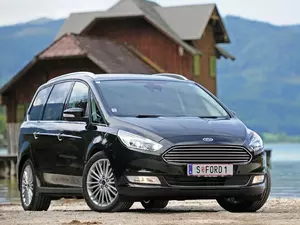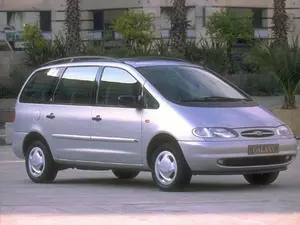
| Engine | 0—60 mph | 0—100 km/h | Top Speed | Averange Economy |
|---|---|---|---|---|
| 2.0 EcoBlue | 10.2 s | 10.7 s | 121 mph | 46 mpg |
| 1.5 EcoBoost | 9.5 s | 10 s | 121 mph | 36 mpg |
| 2.0 EcoBlue Bi-Turbo | 8.3 s | 8.7 s | 134 mph | 39 mpg |
| 2.0 EcoBoost | 8.2 s | 8.6 s | 138 mph | 30 mpg |
| 2.0 TDCi | 8.5 s | 8.9 s | 133 mph | 43 mpg |
| Engine | 2.0 EcoBlue |
|---|---|
| 0—60 mph | 10.2 s |
| 0—100 km/h | 10.7 s |
| Top Speed | 121 mph |
| Averange Economy | 46 mpg |
| Engine | 1.5 EcoBoost |
| 0—60 mph | 9.5 s |
| 0—100 km/h | 10 s |
| Top Speed | 121 mph |
| Averange Economy | 36 mpg |
| Engine | 2.0 EcoBlue Bi-Turbo |
| 0—60 mph | 8.3 s |
| 0—100 km/h | 8.7 s |
| Top Speed | 134 mph |
| Averange Economy | 39 mpg |
| Engine | 2.0 EcoBoost |
| 0—60 mph | 8.2 s |
| 0—100 km/h | 8.6 s |
| Top Speed | 138 mph |
| Averange Economy | 30 mpg |
| Engine | 2.0 TDCi |
| 0—60 mph | 8.5 s |
| 0—100 km/h | 8.9 s |
| Top Speed | 133 mph |
| Averange Economy | 43 mpg |
In 2015, Ford Galaxy 0-60 acceleration was between 8.2 and 10.2 seconds.
Ford Galaxy 0-60 mph was up to 7% slower in 2015 than world's average.
In 2015, Ford Galaxy 0-60 mph to car weight ratio is shown below:
| Vehicle | Acceleration 0—60 mph (0—100 km/h) | Maximum speed | Acceleration to passenger ratio | Fuel consumption at high speed | Fuel type / gearbox |
|---|---|---|---|---|---|
| 2.0 EcoBlue | 10.2 s to 60 mph (10.7 s to 100 km/h) | 121 mph (194 km/h) | 1.5 s to 60 mph / person | 51 mpg (4.6 L per 100 km) | Diesel |
| 1.5 EcoBoost | 9.5 s to 60 mph (10 s to 100 km/h) | 121 mph (195 km/h) | 1.9 s to 60 mph / person | 42 mpg (5.6 L per 100 km) | Petrol (Gasoline) |
| 2.0 EcoBlue Bi-Turbo | 8.3 s to 60 mph (8.7 s to 100 km/h) | 134 mph (216 km/h) | 1.7 s to 60 mph / person | 44 mpg (5.4 L per 100 km) | Diesel / 8 |
| 2.0 EcoBoost | 8.2 s to 60 mph (8.6 s to 100 km/h) | 138 mph (222 km/h) | 1.6 s to 60 mph / person | 36 mpg (6.5 L per 100 km) | Petrol (Gasoline) / 6 |
| 2.0 TDCi | 8.5 s to 60 mph (8.9 s to 100 km/h) | 133 mph (214 km/h) | 1.7 s to 60 mph / person | 46 mpg (5.1 L per 100 km) | Diesel / 6 Powershift |
| Vehicle | 2.0 EcoBlue |
|---|---|
| Acceleration 0-60 mph (0-100 km/h) | 10.2 s to 60 mph (10.7 s to 100 km/h) |
| Maximum speed | 121 mph (194 km/h) |
| Acceleration to passenger ratio | 1.5 s to 60 mph / person |
| Fuel consumption at high speed | 51 mpg (4.6 L per 100 km) |
| Fuel type / gearbox | Diesel |
| Vehicle | 1.5 EcoBoost |
| Acceleration 0-60 mph (0-100 km/h) | 9.5 s to 60 mph (10 s to 100 km/h) |
| Maximum speed | 121 mph (195 km/h) |
| Acceleration to passenger ratio | 1.9 s to 60 mph / person |
| Fuel consumption at high speed | 42 mpg (5.6 L per 100 km) |
| Fuel type / gearbox | Petrol (Gasoline) |
| Vehicle | 2.0 EcoBlue Bi-Turbo |
| Acceleration 0-60 mph (0-100 km/h) | 8.3 s to 60 mph (8.7 s to 100 km/h) |
| Maximum speed | 134 mph (216 km/h) |
| Acceleration to passenger ratio | 1.7 s to 60 mph / person |
| Fuel consumption at high speed | 44 mpg (5.4 L per 100 km) |
| Fuel type / gearbox | Diesel / 8 |
| Vehicle | 2.0 EcoBoost |
| Acceleration 0-60 mph (0-100 km/h) | 8.2 s to 60 mph (8.6 s to 100 km/h) |
| Maximum speed | 138 mph (222 km/h) |
| Acceleration to passenger ratio | 1.6 s to 60 mph / person |
| Fuel consumption at high speed | 36 mpg (6.5 L per 100 km) |
| Fuel type / gearbox | Petrol (Gasoline) / 6 |
| Vehicle | 2.0 TDCi |
| Acceleration 0-60 mph (0-100 km/h) | 8.5 s to 60 mph (8.9 s to 100 km/h) |
| Maximum speed | 133 mph (214 km/h) |
| Acceleration to passenger ratio | 1.7 s to 60 mph / person |
| Fuel consumption at high speed | 46 mpg (5.1 L per 100 km) |
| Fuel type / gearbox | Diesel / 6 Powershift |

| Engine | 0—60 mph | 0—100 km/h | Top Speed | Averange Economy |
|---|---|---|---|---|
| 2.2 TDCi | 9.1 s | 9.6 s | 129 mph | 35 mpg |
| 1.8 TDCi | 11.3 s | 11.9 s | 116 mph | - |
| 2.0 i 16V | 10.6 s | 11.2 s | 121 mph | - |
| 2.0 TDCi | 10 s | 10.5 s | 120 mph | - |
| 2.0 | 10 s | 10.5 s | 118 mph | 32 mpg |
| 2.3 i 16V | 11 s | 11.6 s | 119 mph | 24 mpg |
| Engine | 2.2 TDCi |
|---|---|
| 0—60 mph | 9.1 s |
| 0—100 km/h | 9.6 s |
| Top Speed | 129 mph |
| Averange Economy | 35 mpg |
| Engine | 1.8 TDCi |
| 0—60 mph | 11.3 s |
| 0—100 km/h | 11.9 s |
| Top Speed | 116 mph |
| Averange Economy | - |
| Engine | 2.0 i 16V |
| 0—60 mph | 10.6 s |
| 0—100 km/h | 11.2 s |
| Top Speed | 121 mph |
| Averange Economy | - |
| Engine | 2.0 TDCi |
| 0—60 mph | 10 s |
| 0—100 km/h | 10.5 s |
| Top Speed | 120 mph |
| Averange Economy | - |
| Engine | 2.0 |
| 0—60 mph | 10 s |
| 0—100 km/h | 10.5 s |
| Top Speed | 118 mph |
| Averange Economy | 32 mpg |
| Engine | 2.3 i 16V |
| 0—60 mph | 11 s |
| 0—100 km/h | 11.6 s |
| Top Speed | 119 mph |
| Averange Economy | 24 mpg |
In 2006, Ford Galaxy 0-60 acceleration was between 9.1 and 11.3 seconds.
Ford Galaxy 0-60 mph was up to 19% slower in 2006 than world's average.
In 2006, Ford Galaxy 0-60 mph to car weight ratio is shown below:
| Vehicle | Acceleration 0—60 mph (0—100 km/h) | Maximum speed | Acceleration to passenger ratio | Fuel consumption at high speed | Fuel type / gearbox |
|---|---|---|---|---|---|
| 2.2 TDCi | 9.1 s to 60 mph (9.6 s to 100 km/h) | 129 mph (208 km/h) | 1.3 s to 60 mph / person | 44 mpg (5.3 L per 100 km) | Diesel |
| 1.8 TDCi | 11.3 s to 60 mph (11.9 s to 100 km/h) | 116 mph (187 km/h) | 1.6 s to 60 mph / person | 44 mpg (5.3 L per 100 km) | Diesel |
| 2.0 i 16V | 10.6 s to 60 mph (11.2 s to 100 km/h) | 121 mph (194 km/h) | 1.5 s to 60 mph / person | 36 mpg (6.5 L per 100 km) | Petrol (Gasoline) |
| 2.0 TDCi | 10 s to 60 mph (10.5 s to 100 km/h) | 120 mph (193 km/h) | 1.4 s to 60 mph / person | 43 mpg (5.5 L per 100 km) | Diesel |
| 2.0 | 10 s to 60 mph (10.5 s to 100 km/h) | 118 mph (190 km/h) | 1.4 s to 60 mph / person | 40 mpg (5.9 L per 100 km) | Petrol (Gasoline) / 6 |
| 2.3 i 16V | 11 s to 60 mph (11.6 s to 100 km/h) | 119 mph (191 km/h) | 1.6 s to 60 mph / person | 31 mpg (7.5 L per 100 km) | Petrol (Gasoline) / 6 |
| Vehicle | 2.2 TDCi |
|---|---|
| Acceleration 0-60 mph (0-100 km/h) | 9.1 s to 60 mph (9.6 s to 100 km/h) |
| Maximum speed | 129 mph (208 km/h) |
| Acceleration to passenger ratio | 1.3 s to 60 mph / person |
| Fuel consumption at high speed | 44 mpg (5.3 L per 100 km) |
| Fuel type / gearbox | Diesel |
| Vehicle | 1.8 TDCi |
| Acceleration 0-60 mph (0-100 km/h) | 11.3 s to 60 mph (11.9 s to 100 km/h) |
| Maximum speed | 116 mph (187 km/h) |
| Acceleration to passenger ratio | 1.6 s to 60 mph / person |
| Fuel consumption at high speed | 44 mpg (5.3 L per 100 km) |
| Fuel type / gearbox | Diesel |
| Vehicle | 2.0 i 16V |
| Acceleration 0-60 mph (0-100 km/h) | 10.6 s to 60 mph (11.2 s to 100 km/h) |
| Maximum speed | 121 mph (194 km/h) |
| Acceleration to passenger ratio | 1.5 s to 60 mph / person |
| Fuel consumption at high speed | 36 mpg (6.5 L per 100 km) |
| Fuel type / gearbox | Petrol (Gasoline) |
| Vehicle | 2.0 TDCi |
| Acceleration 0-60 mph (0-100 km/h) | 10 s to 60 mph (10.5 s to 100 km/h) |
| Maximum speed | 120 mph (193 km/h) |
| Acceleration to passenger ratio | 1.4 s to 60 mph / person |
| Fuel consumption at high speed | 43 mpg (5.5 L per 100 km) |
| Fuel type / gearbox | Diesel |
| Vehicle | 2.0 |
| Acceleration 0-60 mph (0-100 km/h) | 10 s to 60 mph (10.5 s to 100 km/h) |
| Maximum speed | 118 mph (190 km/h) |
| Acceleration to passenger ratio | 1.4 s to 60 mph / person |
| Fuel consumption at high speed | 40 mpg (5.9 L per 100 km) |
| Fuel type / gearbox | Petrol (Gasoline) / 6 |
| Vehicle | 2.3 i 16V |
| Acceleration 0-60 mph (0-100 km/h) | 11 s to 60 mph (11.6 s to 100 km/h) |
| Maximum speed | 119 mph (191 km/h) |
| Acceleration to passenger ratio | 1.6 s to 60 mph / person |
| Fuel consumption at high speed | 31 mpg (7.5 L per 100 km) |
| Fuel type / gearbox | Petrol (Gasoline) / 6 |

| Engine | 0—60 mph | 0—100 km/h | Top Speed | Averange Economy |
|---|---|---|---|---|
| 2.8i V6 4x4 | 11 s | 11.6 s | 120 mph | - |
| 2.8 V6 | 9.4 s | 9.9 s | 135 mph | 22 mpg |
| 2.3 16V | 12.1 s | 12.7 s | 119 mph | 23 mpg |
| 1.9 TDI | 16.2 s | 17.1 s | 99 mph | 35 mpg |
| 2.8i V6 | 10 s | 10.5 s | 124 mph | - |
| 2.0 i | 12.4 s | 13.1 s | 110 mph | 23 mpg |
| Engine | 2.8i V6 4x4 |
|---|---|
| 0—60 mph | 11 s |
| 0—100 km/h | 11.6 s |
| Top Speed | 120 mph |
| Averange Economy | - |
| Engine | 2.8 V6 |
| 0—60 mph | 9.4 s |
| 0—100 km/h | 9.9 s |
| Top Speed | 135 mph |
| Averange Economy | 22 mpg |
| Engine | 2.3 16V |
| 0—60 mph | 12.1 s |
| 0—100 km/h | 12.7 s |
| Top Speed | 119 mph |
| Averange Economy | 23 mpg |
| Engine | 1.9 TDI |
| 0—60 mph | 16.2 s |
| 0—100 km/h | 17.1 s |
| Top Speed | 99 mph |
| Averange Economy | 35 mpg |
| Engine | 2.8i V6 |
| 0—60 mph | 10 s |
| 0—100 km/h | 10.5 s |
| Top Speed | 124 mph |
| Averange Economy | - |
| Engine | 2.0 i |
| 0—60 mph | 12.4 s |
| 0—100 km/h | 13.1 s |
| Top Speed | 110 mph |
| Averange Economy | 23 mpg |
In 1995, Ford Galaxy 0-60 acceleration was between 9.4 and 16.2 seconds.
Ford Galaxy 0-60 mph was up to 70% slower in 1995 than world's average.
In 1995, Ford Galaxy 0-60 mph to car weight ratio is shown below:
| Vehicle | Acceleration 0—60 mph (0—100 km/h) | Maximum speed | Acceleration to passenger ratio | Fuel consumption at high speed | Fuel type / gearbox |
|---|---|---|---|---|---|
| 2.8i V6 4x4 | 11 s to 60 mph (11.6 s to 100 km/h) | 120 mph (193 km/h) | 1.6 s to 60 mph / person | 24 mpg (9.9 L per 100 km) | Petrol (Gasoline) |
| 2.8 V6 | 9.4 s to 60 mph (9.9 s to 100 km/h) | 135 mph (217 km/h) | 1.3 s to 60 mph / person | 28 mpg (8.5 L per 100 km) | Petrol (Gasoline) |
| 2.3 16V | 12.1 s to 60 mph (12.7 s to 100 km/h) | 119 mph (191 km/h) | 1.7 s to 60 mph / person | 30 mpg (7.8 L per 100 km) | Petrol (Gasoline) |
| 1.9 TDI | 16.2 s to 60 mph (17.1 s to 100 km/h) | 99 mph (160 km/h) | 2.3 s to 60 mph / person | 42 mpg (5.6 L per 100 km) | Diesel |
| 2.8i V6 | 10 s to 60 mph (10.5 s to 100 km/h) | 124 mph (199 km/h) | 1.4 s to 60 mph / person | 27 mpg (8.7 L per 100 km) | Petrol (Gasoline) |
| 2.0 i | 12.4 s to 60 mph (13.1 s to 100 km/h) | 110 mph (177 km/h) | 1.8 s to 60 mph / person | 30 mpg (7.9 L per 100 km) | Petrol (Gasoline) |
| Vehicle | 2.8i V6 4x4 |
|---|---|
| Acceleration 0-60 mph (0-100 km/h) | 11 s to 60 mph (11.6 s to 100 km/h) |
| Maximum speed | 120 mph (193 km/h) |
| Acceleration to passenger ratio | 1.6 s to 60 mph / person |
| Fuel consumption at high speed | 24 mpg (9.9 L per 100 km) |
| Fuel type / gearbox | Petrol (Gasoline) |
| Vehicle | 2.8 V6 |
| Acceleration 0-60 mph (0-100 km/h) | 9.4 s to 60 mph (9.9 s to 100 km/h) |
| Maximum speed | 135 mph (217 km/h) |
| Acceleration to passenger ratio | 1.3 s to 60 mph / person |
| Fuel consumption at high speed | 28 mpg (8.5 L per 100 km) |
| Fuel type / gearbox | Petrol (Gasoline) |
| Vehicle | 2.3 16V |
| Acceleration 0-60 mph (0-100 km/h) | 12.1 s to 60 mph (12.7 s to 100 km/h) |
| Maximum speed | 119 mph (191 km/h) |
| Acceleration to passenger ratio | 1.7 s to 60 mph / person |
| Fuel consumption at high speed | 30 mpg (7.8 L per 100 km) |
| Fuel type / gearbox | Petrol (Gasoline) |
| Vehicle | 1.9 TDI |
| Acceleration 0-60 mph (0-100 km/h) | 16.2 s to 60 mph (17.1 s to 100 km/h) |
| Maximum speed | 99 mph (160 km/h) |
| Acceleration to passenger ratio | 2.3 s to 60 mph / person |
| Fuel consumption at high speed | 42 mpg (5.6 L per 100 km) |
| Fuel type / gearbox | Diesel |
| Vehicle | 2.8i V6 |
| Acceleration 0-60 mph (0-100 km/h) | 10 s to 60 mph (10.5 s to 100 km/h) |
| Maximum speed | 124 mph (199 km/h) |
| Acceleration to passenger ratio | 1.4 s to 60 mph / person |
| Fuel consumption at high speed | 27 mpg (8.7 L per 100 km) |
| Fuel type / gearbox | Petrol (Gasoline) |
| Vehicle | 2.0 i |
| Acceleration 0-60 mph (0-100 km/h) | 12.4 s to 60 mph (13.1 s to 100 km/h) |
| Maximum speed | 110 mph (177 km/h) |
| Acceleration to passenger ratio | 1.8 s to 60 mph / person |
| Fuel consumption at high speed | 30 mpg (7.9 L per 100 km) |
| Fuel type / gearbox | Petrol (Gasoline) |